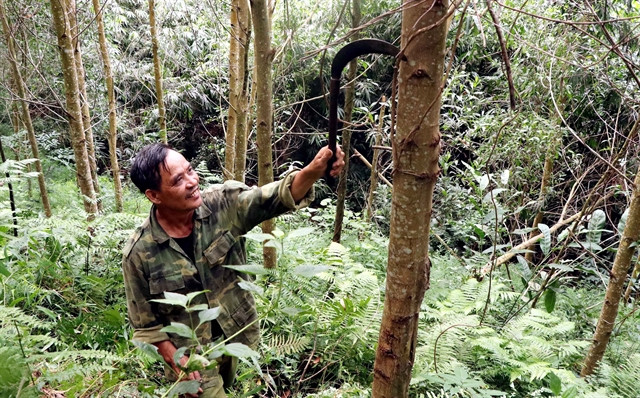 |
| A growing forest in Sơn Dương District, Tuyên Quang Province. VNA/VNS Photo |
If the carbon market in Việt Nam is well managed and developed, it can bring in hundreds of millions of US dollars each year to the country, help protect forests, create a sustainable source of finance, and support local communities living near forests.
That was the message from Trần Quang Bảo, director of the Việt Nam Department of Forest speaking at a workshop on “Forest Carbon - Potential to Create New Financial Sources for Forest Protection and Development” held in Hà Nội on Thursday.
The workshop aimed to share international experiences on carbon markets, carbon credit management policies and domestic carbon market development.
It also focused on the current status and potential of forest carbon, identifying opportunities as well as challenges that Việt Nam is facing in developing a forest carbon market.
Bảo said Việt Nam has great potential to develop a forest carbon market thanks to its large forest area and environmental protection commitments.
“Participating in the carbon market also helps Việt Nam fulfill its international commitments on climate change, especially the goal of carbon neutrality by 2050 that we committed to at COP26,” he said.
Việt Nam is one of the countries most severely affected by climate change. In that context, with more than 14.8 million hectares, accounting for about 42.02 per cent of the natural area, Việt Nam’s forests play an extremely important role in minimising the negative impacts of climate change, he said.
"Mobilising financial resources from the exchange of forest carbon credits will contribute to forest conservation, greenhouse gas emission reduction and sustainable economic development in many countries, especially those with large forest areas like Việt Nam,” he said.
He said that, to tap this potential, challenges in the legal, financial, technical, and community engagement frameworks need to be addressed. “Improving governance, strengthening international cooperation, and promoting public awareness are important steps for Việt Nam to develop an effective forest carbon credit market.”
Forestry is currently the only sector with the potential for negative net emissions. This success has been made thanks to the Government's forestry development policies such as the closure of natural forests, afforestation, forest protection and development, and international support in forestry, he said.
Việt Nam is currently implementing the Emission Reductions Payment Agreements (ERPA) in the north central region, inked between the World Bank and the Ministry of Agriculture and Rural Development (MARD). As a result, 10.3 million tons of CO2 have been successfully transferred and US$51.5 million has been received in the 2018-19 period.
The MARD is completing a dossier for submission to the Prime Minister for considering the signing of similar agreements for 11 provinces in the Central Highlands and south-central regions, Bảo said.
Tô Xuân Phúc, managing director of Forest Trends' Forest Policy, Trade, and Finance Initiative, said there are currently voluntary and mandatory carbon markets. In the voluntary market, organisations and individuals can buy credits to reduce emissions, usually to serve the net-zero target. In the mandatory market, credits are bought and sold to demonstrate compliance with emission trading system programmes and carbon taxes.
According to Hà Công Tuấn, former Permanent Deputy Minister of Agriculture and Rural Development, thanks to international support, Việt Nam’s total amount of emission reduction from forests has reached 56-57 million tonnes per year. This serves as the basis for Việt Nam to sign the ERPA for the first six provinces in the north-central region.
He forecasted that there would not be much emission reduction from forests in the coming time because “we are mainly replanting the exploited production forest area. Meanwhile, in the previous period, the annual forest planting area was mostly newly planted forest.”
From now to 2028, when Việt Nam officially forms a carbon market, the State needs to take flexible steps to shape the market, he said, adding that MARD and other relevant sectors should propose the Prime Minister to continue maintaining the voluntary trading market based on international cooperation on climate change.
This should be considered a pilot activity for the operation of the carbon trading market by 2028, he said. — VNS